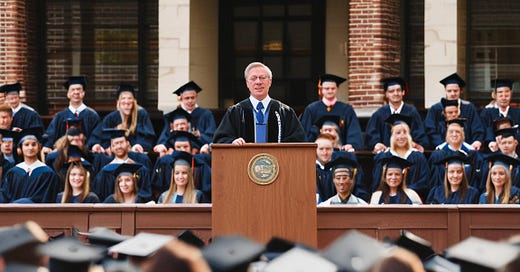Cancel culture arrived on college campuses just in time for graduation.
First, radio and TV personality Michael Smerconish was uninvited from being the commencement speaker at Dickinson College in Carlisle, PA, after a student unearthed quotes from his 2005 book that criticized U.S. flight security protocol prior to 9/11. Smerconish later said that his commencement speech was going to focus on encouraging independent thought while restoring civility to public discourse.
Next, several Duke University grads walked out of their commencement in protest of speaker Jerry Seinfeld because of his support for Israel following the October 7 attacks. During his speech, Seinfeld, who is Jewish, said nothing about the Isreal-Palestine conflict but instead concentrated on finding your passion and keeping your sense of humor throughout life.
Finally, Kansas City Chiefs placekicker Harrison Butker received a whirlwind of negative press after his commencement speech at Benedictine College, a small, liberal arts college in Atchison, KS. While Butker’s speech hit hard against “degenerative cultural values” in the United States and chastised modern Church leaders, it was his comments on women and motherhood that drew the most ire. (“Some of you may go on to lead successful careers in the world, but I would venture to guess that the majority of you are most excited about your marriage and the children you will bring into this world.”)
After such controversies, could the end of the commencement speaker be near? One would certainly be wary of accepting such an offer knowing that one’s entire past could be scrutinized and the most minute details could result in a firestorm. Thanks to social media, even speaking one’s mind at a small conservative Catholic college could unleash a ton of criticism from people who otherwise dismiss traditional Catholic teaching.
Sadly, in a quest to be inclusive and accepting, the cancellers are missing an opportunity to actually listen with open minds. They’re also narrowing their perceptions of people based on a single incident or comment. They are saying, “We’re only inclusive and accepting if we agree with what you have to say.” In some cases, they may not even know why they disagree with a proposed speaker.
Even worse, the cancellers use words like “islamophobic,” “pro-genocide,” “misogynistic” and “transphobic” to describe the people with whom they disagree. These inflammatory words should be reserved for the worst human behavior, not for someone who thinks that the United States should have had stricter rules about suspicious Muslim travelers prior to 9/11 or that one of the greatest gifts in life is to become a parent.
Smerconish, for example, did not utter islamophobic rhetoric when he wrote about pre-9/11 security measures and how they impacted 9/11. He was saying the system was flawed and helped contribute to the devastating events. Seinfeld has as much of a right to stand beside Israel as someone with Palestinian heritage has the right to support Palestine. As for Butker, his conservative leanings might not even sit well with some Catholics, but it’s his prerogative to share his truths with Catholic college students.
What did the cancellers gain through their protests? A brief moment of personal satisfaction, perhaps. They certainly didn’t hurt any of the speaker’s popularity. Butker’s NFL jersey, in fact, became one of the top sellers after his commencement speech.
What the cancellers lost was an opportunity to hear engaging speakers so they could form opinions based on critical thinking skills and not on sound bites. They missed Seinfeld inviting students at Duke to embrace their privilege, rather than be embarrassed by it, in order to make the most of their lives. They missed one of the main points of Butker’s speech, which was that as important as it is to follow your career goals, it’s the personal connections in life that bring the most satisfaction.
Kudos to Smerconish, Seinfeld and Butker for not doling out the requisite apology on X. Being uninvited from Dickinson seems to have only bolstered Smerconish’s belief that civil discourse must make a comeback. Seinfeld carried on with his comedy and promoting his debut as a director with the film “Unfrosted.” Butker says he will continue to speak on traditional Catholic teaching.
You can be sure that next year, as colleges and universities begin to research potential commencement speakers, their bios, social media posts, books, interviews and anything else that has come out of their minds and mouths will be picked apart. Seemingly banal individuals will be found to be too controversial to speak. Some students and faculty will hold speakers to an unwritten values system based more on emotion than logic.
In the end, young people just want to graduate and get the hell out of college. Let them do it without all the drama.






"Sadly, in a quest to be inclusive and accepting, the cancellers are missing an opportunity to actually listen with open minds. "
Sadly, this is just further proof that college campuses are not places to expand your thinking or broaden your horizons by living around, learning from, and listening to ideas that are not from your narrow point of view. They are becoming indoctrination camps where censorship abounds. Only predetermined ideas are acceptable, you should NOT hear from someone with a different viewpoint.